A Capable Survival Tactical Hybrid That Makes A Great Camping or Backpacking Companion
There are few combinations that have been as successful as Ka-Bar and Ethan Becker. You could make a strong case for peanut butter and jelly, or penicillin and prostitution, but the Becker Ka-Bar collaboration has arguably had a bigger impact in the knife world.
The BK18 Harpoon is another impressive result of that collaboration.
Specifications
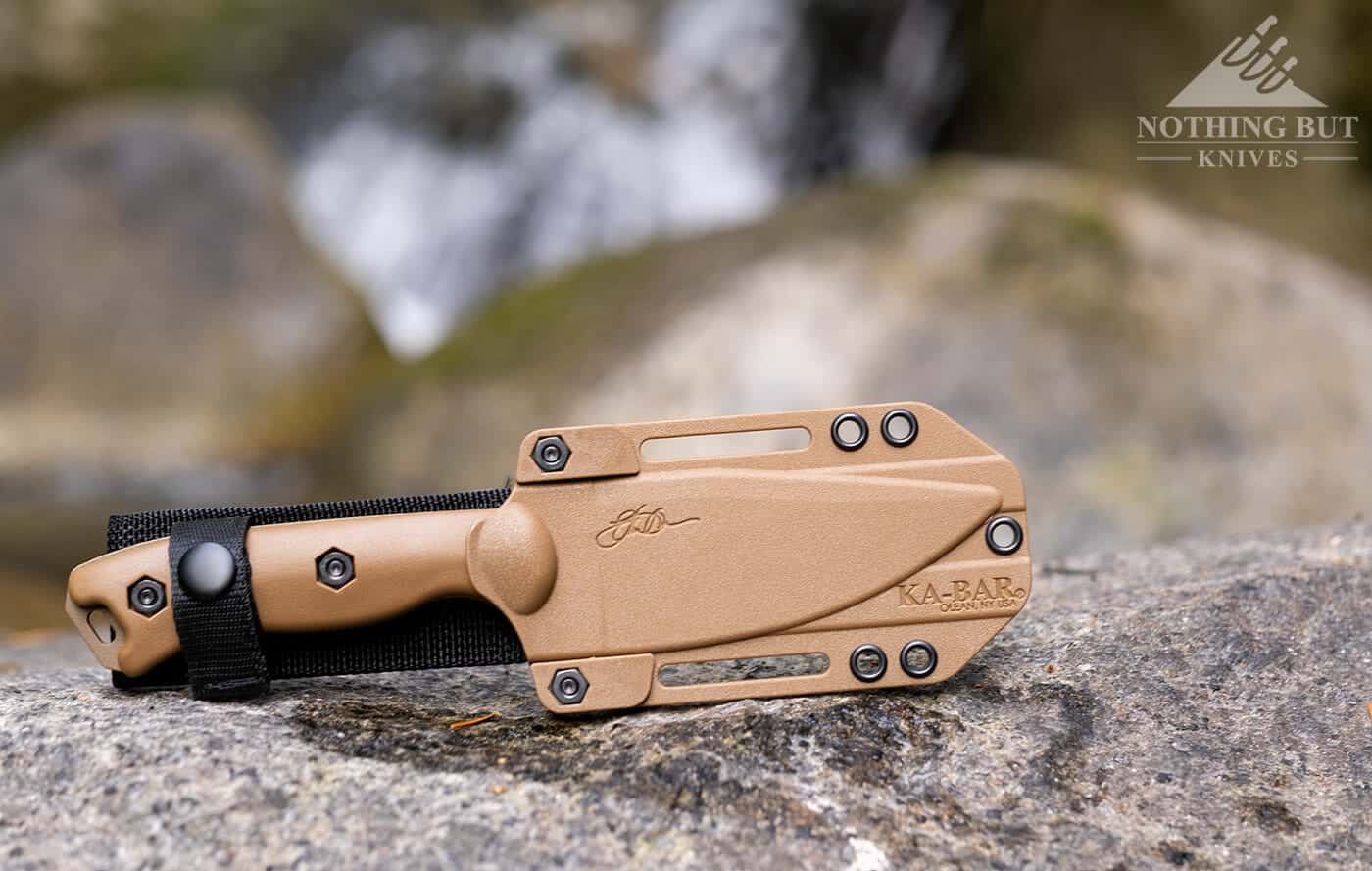
| Overall Length: | 9.375″ |
| Blade Length: | 4.5″ |
| Handle Length: | 5.0″ |
| Blade Steel: | 1095 Cro-Van |
| Blade Grind: | Flat |
| Blade Thickness: | 4.4 mm |
| Blade Style: | Harpoon |
| Handle Material: | Zytel |
| Knife Weight: | 6.8 oz |
| Weight w/ Sheath: | 15.6 oz |
| Sheath: | Celcon Polymer |
| Made in: | USA |
| Price Range: | $80 – 120 |
Pros
| Great sheath |
| Versatile design |
| Comfortable handle and good ergonomics |
| Great balance |
Cons
| Traction coating wears off eventually (like all traction coating) |
| Sheath is not fully Tek-lok compatible |
| The traction coating prevents the knife from throwing spark |
The Blade
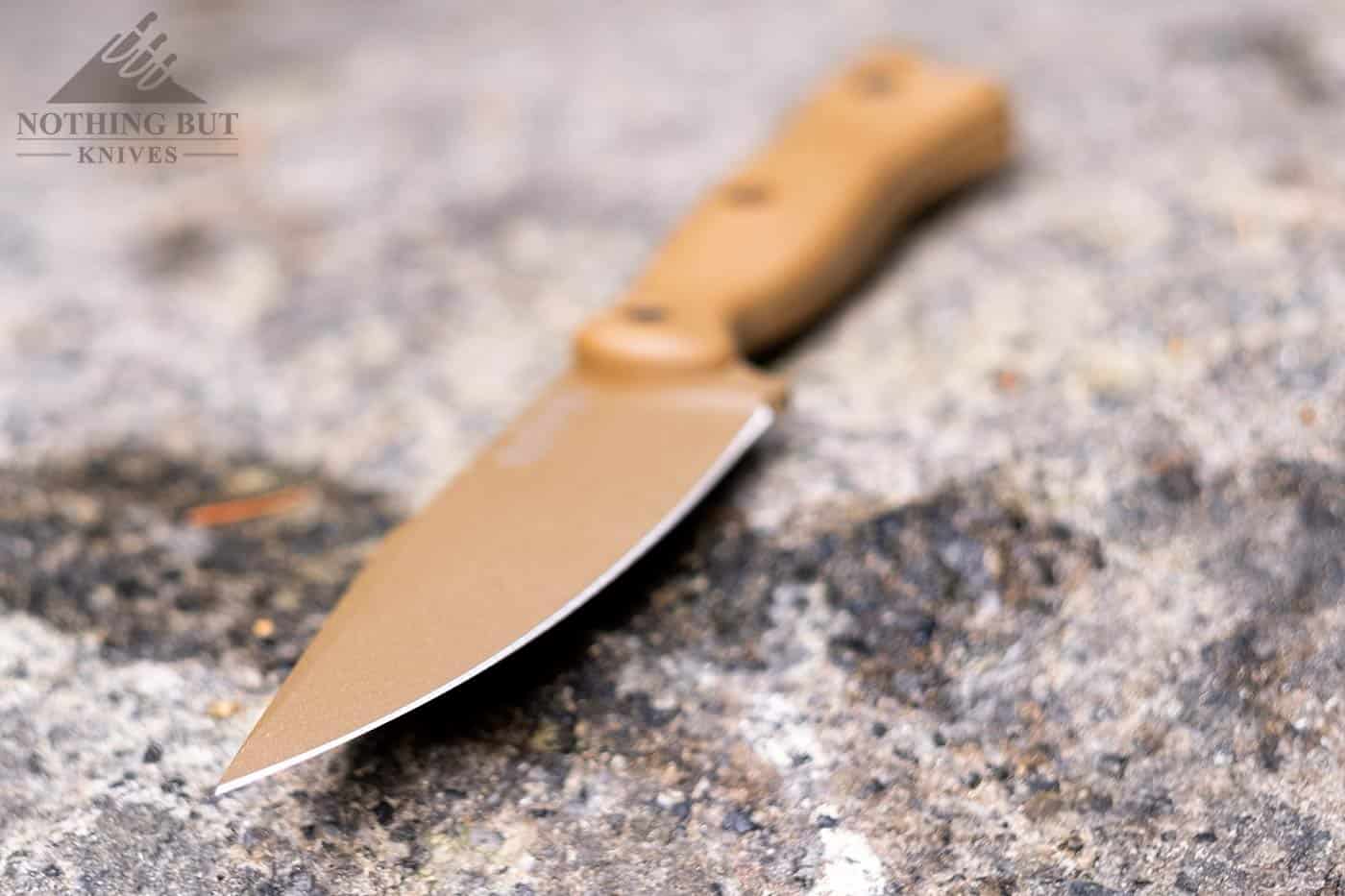
I don’t think I have ever owned a knife with a harpoon-shaped blade before I pulled the trigger on the BK18. Like any other blade style, the harpoon shape has its detractors and advocates. Until now I have remained a harpoon-knife agnostic. (Editor’s Note: The rest of us were just harpoon-knife Calvanists).
After using the BK18 for a few months I think the harpoon shape works well for this knife. I even found myself using the the harpoon hook for extra leverage when doing carving type work. The harpoon barb is well placed just behind the swedge and just in front of the thumb rest on the spine of the knife.
The fact that I found the harpoon hook practical for actual work on a semi regular basis makes me think its location is most likely the result of some fairly thorough testing and product updating on the part of Ethan Becker prior to this knife’s official release. Or maybe designers as experienced as Becker just automatically know about such things and testing is not required.
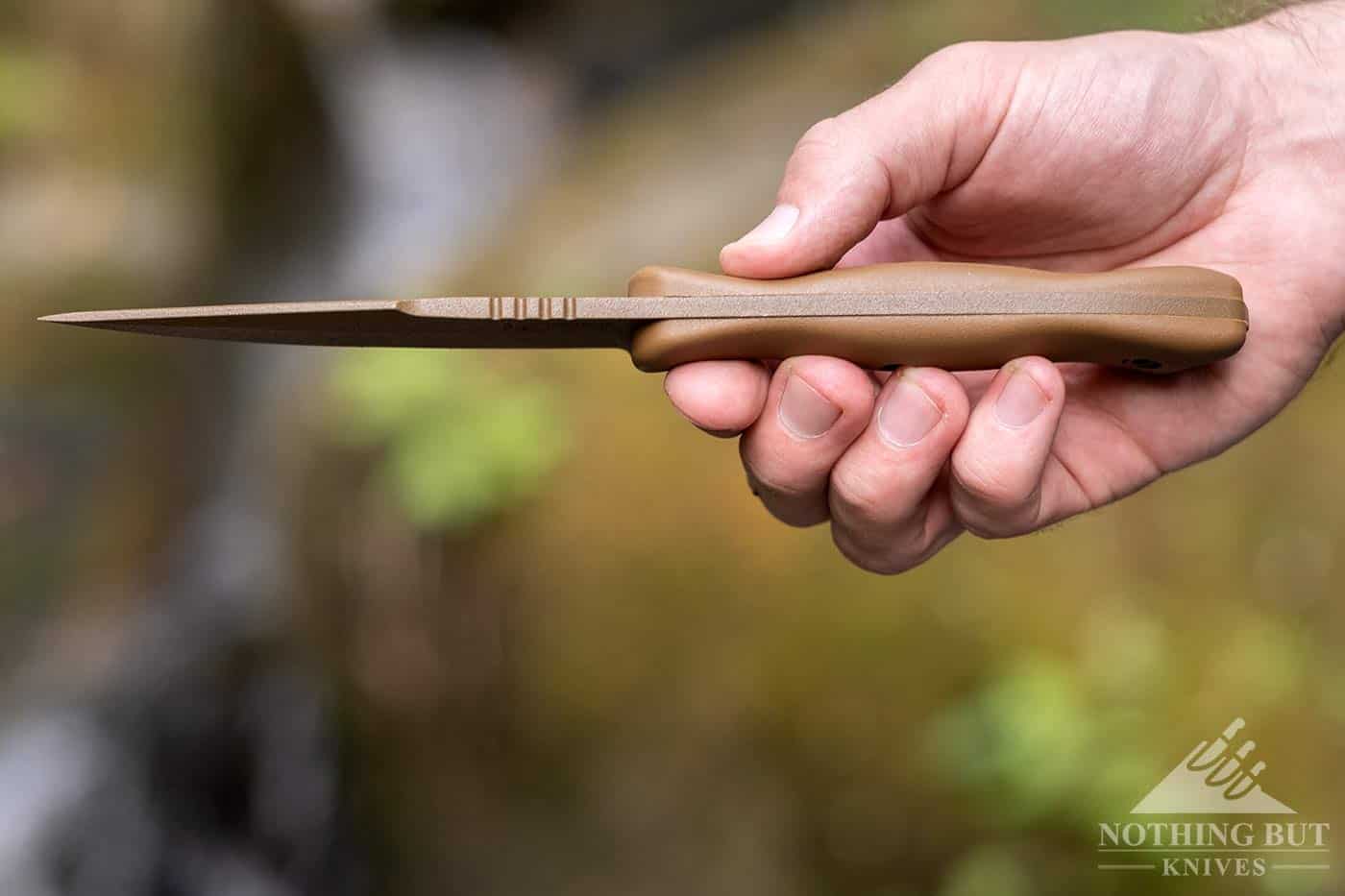
I appreciated the relatively long thumb support area on the blade spine. My thumb never felt cramped or squeezed in the way it does on knives with tall thumb ramps just in front of the handle. The jimping did not cause any discomfort, but I am not sure that it really improved traction that much either.
I am slowly becoming a fan of the sabre grind on bushcraft and camping-style knives. At least when they are on knives with relatively big bellies like the BK18. Obviously the sabre grind works well for harpoon shaped knives because it leaves lots of steel to work with for the hook before the flat part of the grind begins.
The long curve and big belly of the blade make it great for food prep, and the sharpening choil is well placed to make stone clearance easier for sharpening. I do wish the sharpening choil was just a little bit larger though. I found the traction coating to be mostly annoying as it tended to collect dirt and grime, but it may be a welcome feature for those who struggle with their knives getting rusty. (Editor’s Note: I don’t “struggle”, I’m just lazy).
Ka-Bar used the same 1095 CRO-Van steel on the BK18 that they use on most of their other fixed blade knives. It is tough, durable steel that holds an edge fairly well.
It does have more carbon than stainless steel blades, so it needs a little more care and maintenance in the form of drying the knife when needed, and occasionally wiping it down with a food grade knife oil. I would like to see Ka-Bar experiment a bit more with some of the super steels other knife companies are using like Bohler M390 or Elmax even though those steels would require a significant price increase.
Handle Ergonomics And Options
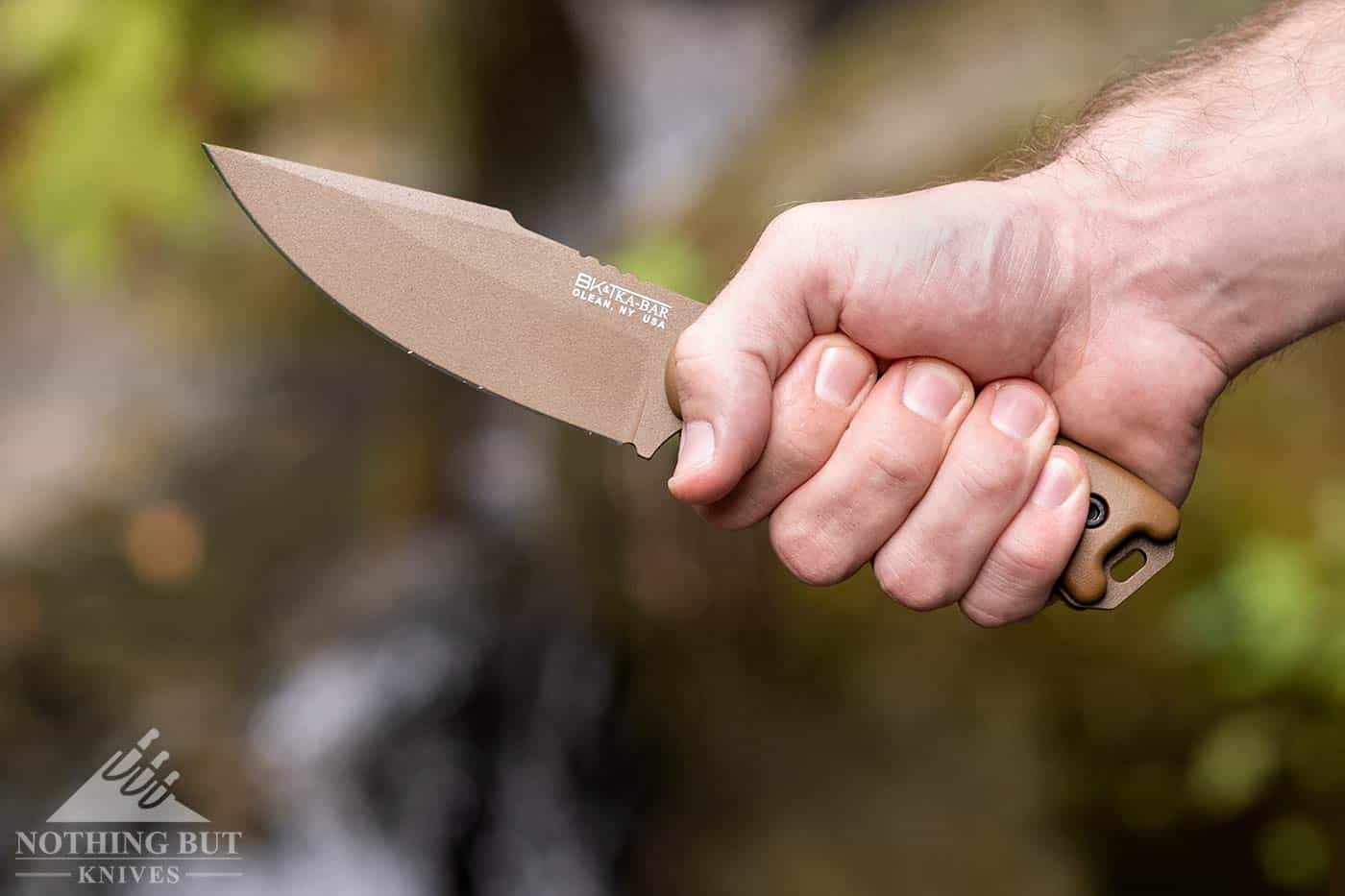
I need to start this section with a disclaimer. I currently have an unhealthy obsession with Micarta handles. This obsession affects both my purchasing choices and my opinions, so keep that in mind, because I am not claiming any sort objectivity when it comes to the handle materials knife manufacturers choose for their knives.
Unfortunately, the BK18 ships with Zytel handle scales. Zytel is a nylon polymer material that that is fairly grippy and stands up well to the elements, but it feels a little too smooth and plasticy than the BK18 design deserves. I don’t hate it, and I stuck with the Zytel scales for the majority of the BK18’s testing. For the most part it performed well.
It was pretty easy to grip even when wet, it stood up to the elements, and it survived a fair amount of beating, dropping and even throwing without showing major wear.
If you are less of a Micarta fanboy than me I don’t expect the Zytel handle scales to automatically generate the same level of discontent I experienced. I assume most folks will be satisfied with the handle scales that ship with the BK18, but I personally would prefer they shipped with the Micarta scales instead.
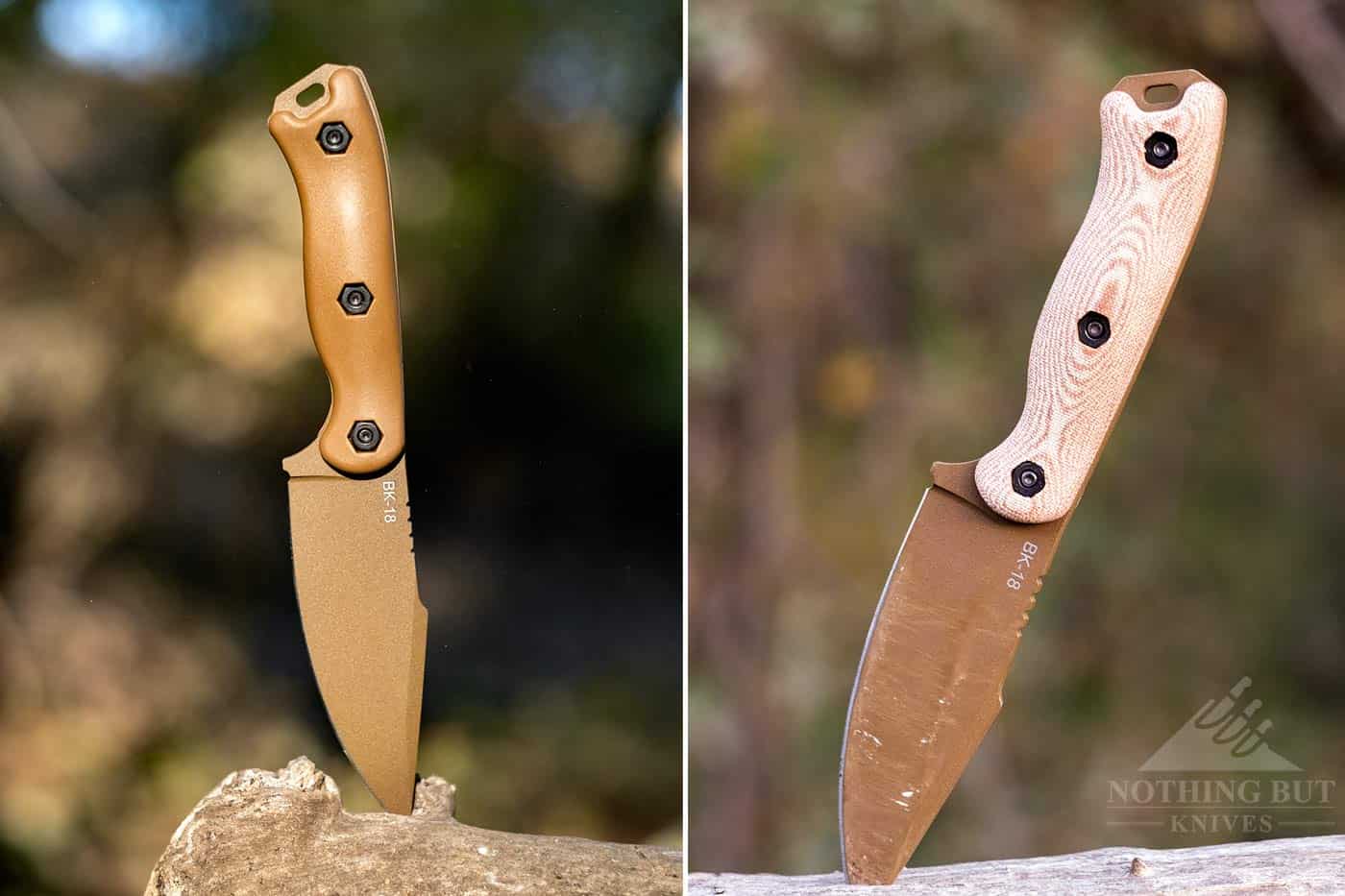
Regardless of what handle material you prefer it is ultimately the great ergonomics of the handle that set the BK18 apart from a lot of other survival knives at its price point.
I am guessing Ethan Becker is a man who hates hot spots, because the beautifully rounded handle has curves in all the right places (Editor’s Note: I was going to say that wasn’t a sex joke, but his attraction to this knife might actually be physical).
No matter how much we chopped, carved or sliced with this knife we never experienced any major discomfort in any one part of our hands. The handle swell is perfectly placed, and the down-turned pommel helps to prevent the nutcracker/ lanyard attachment part of the tang from sticking into the palm of the hand when chopping.
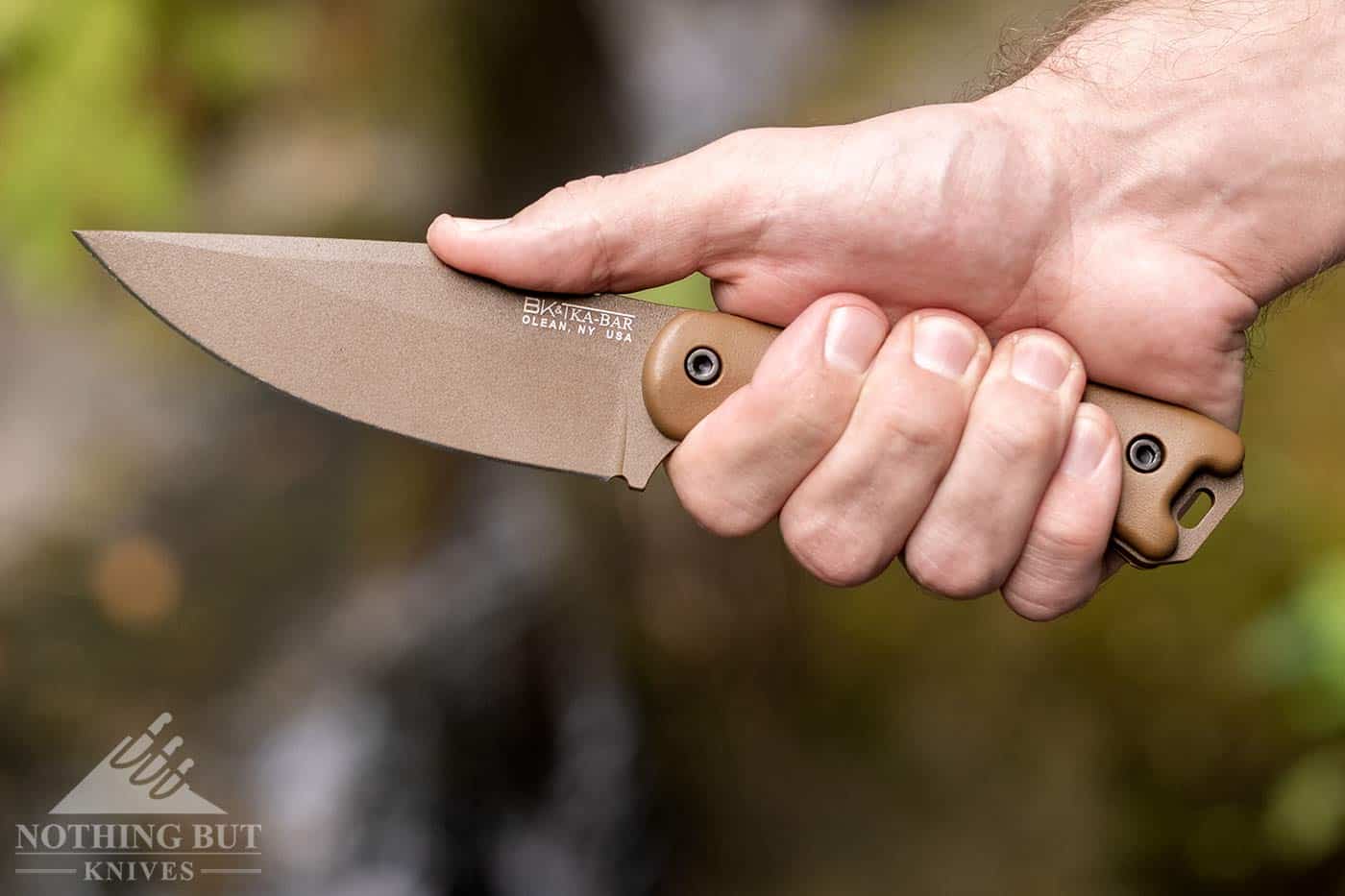
As I mentioned before the length of the thumb rest seems about perfect to ensure the thumb doesn’t feel cramped when the thumb is braced for detail work. The shape of the handle is similar to the Buck Compadre which has one of the most comfortable handles of any knife I have used.
The Sheath
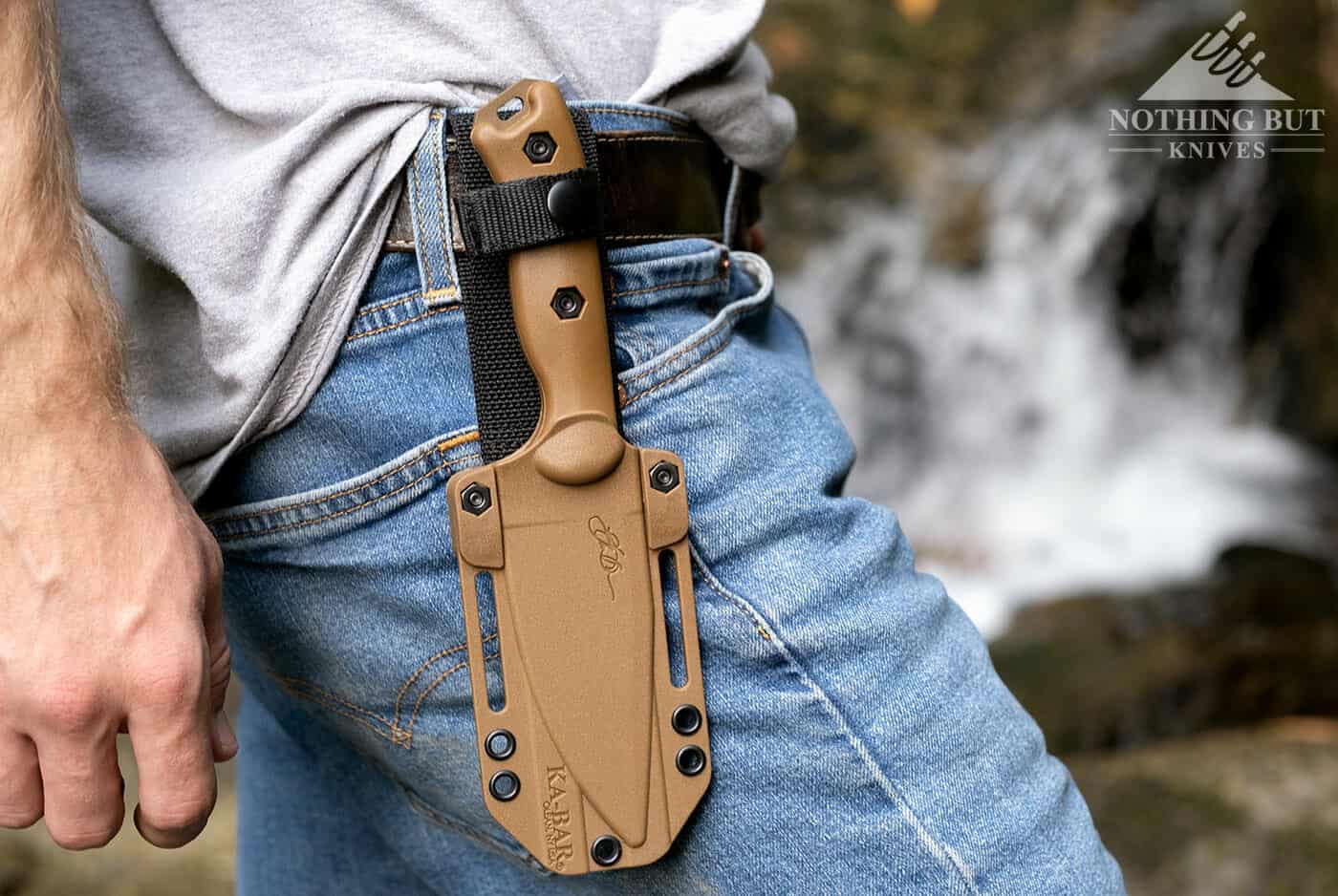
The sheath that ships with the BK18 is a huge improvement over most of the mediocre nylon sheaths that accompany Ka-Bar Becker knives. It’s made of a Celcon polymer material that held up well to all the abuse we threw at it on our outdoor excursions over the last few months.
The nylon belt attachment can be removed, and the numerous lashing points and slots on either side of the sheath can be utilized for any number of customized carry options. The sheath holds the knife well even when the snap is open, but the knife does rattle a bit when the snap is open.
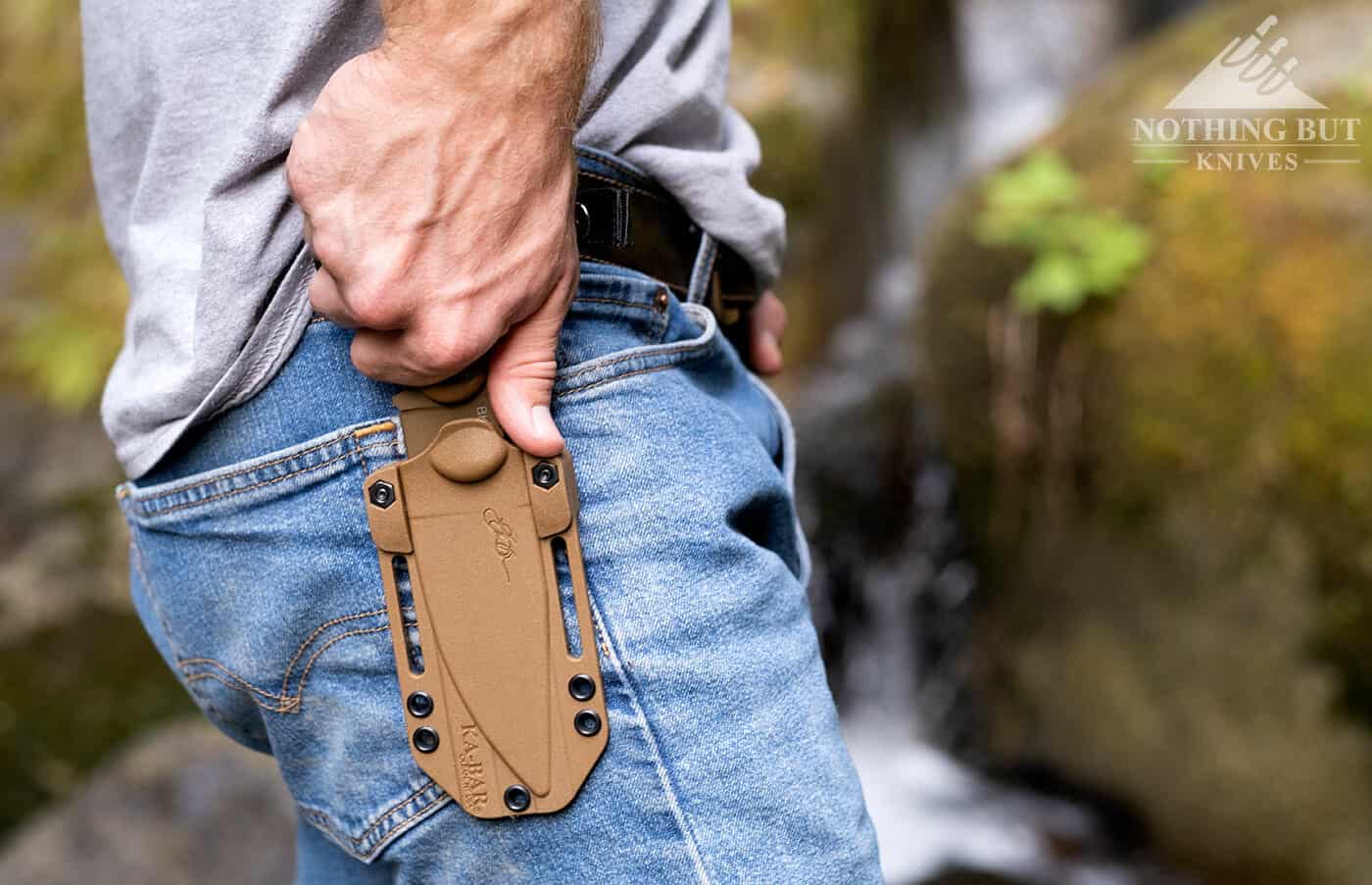
The large thumb ramp is a welcome addition that I wish more knife companies would copy. The knife was easy to draw and replace even when walking. I love the fact that the sheath rides low, because I find that to be the most comfortable.
However, I know that lots of folks prefer to carry their fixed blade knives high (Editor’s Note: Tall folks, probably. Lots of really tall folks). The multiple lashing holes, and and the fact that the nylon belt attachment is removable should make this sheath pretty easy to customize in a way that allows the knife to be carried higher if that is your thing.
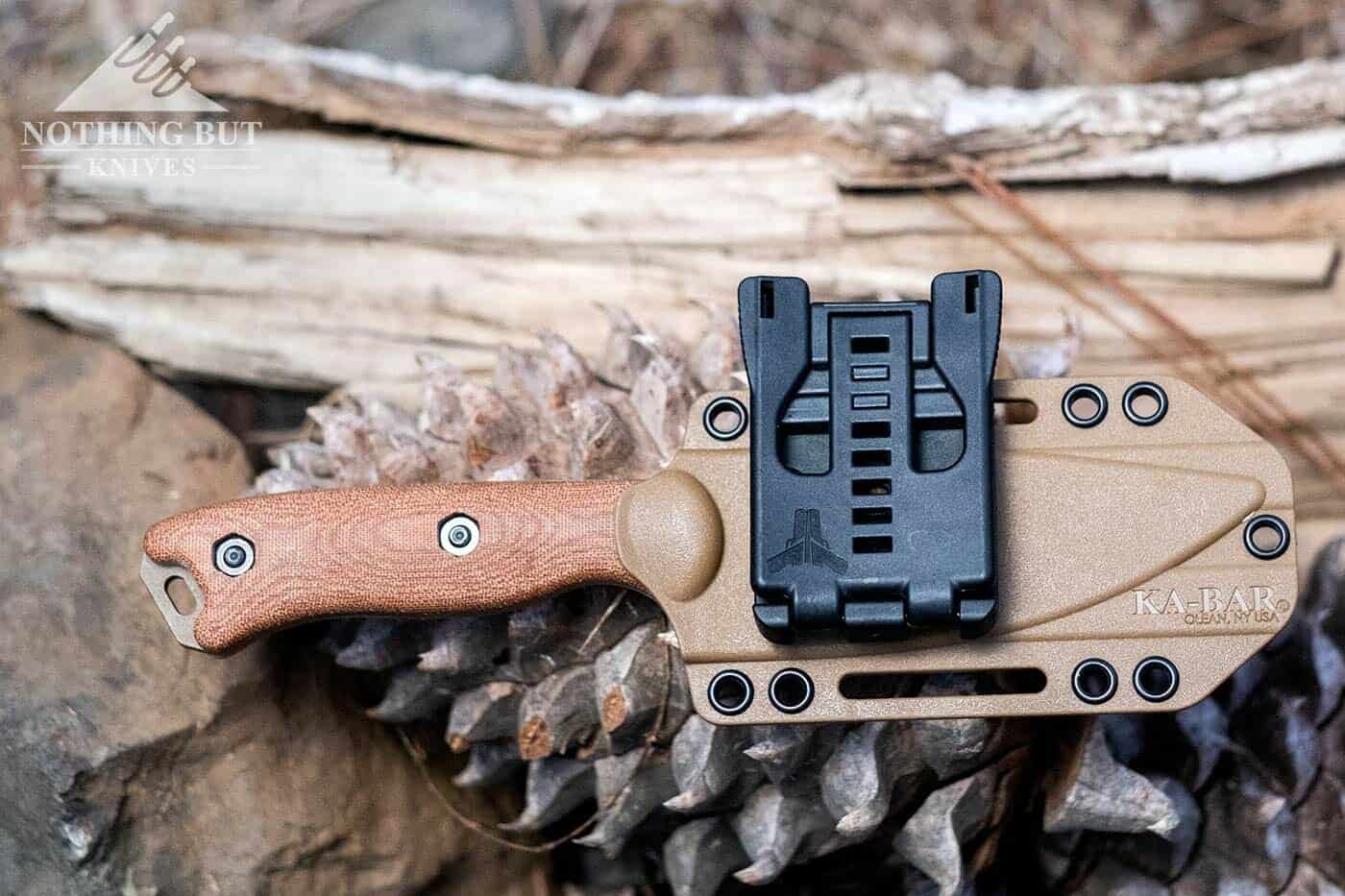
The BK18 is technically not Tek-Lok compatible, but a Tek-Lok can be attached securely by attaching one screw through a lashing hole and another screw through a slot. Obviously this is not the ideal way to attach a Tek-Lok, but it has worked for me for several weeks, and it has allowed me to horizontal carry the BK18.
Field Performance
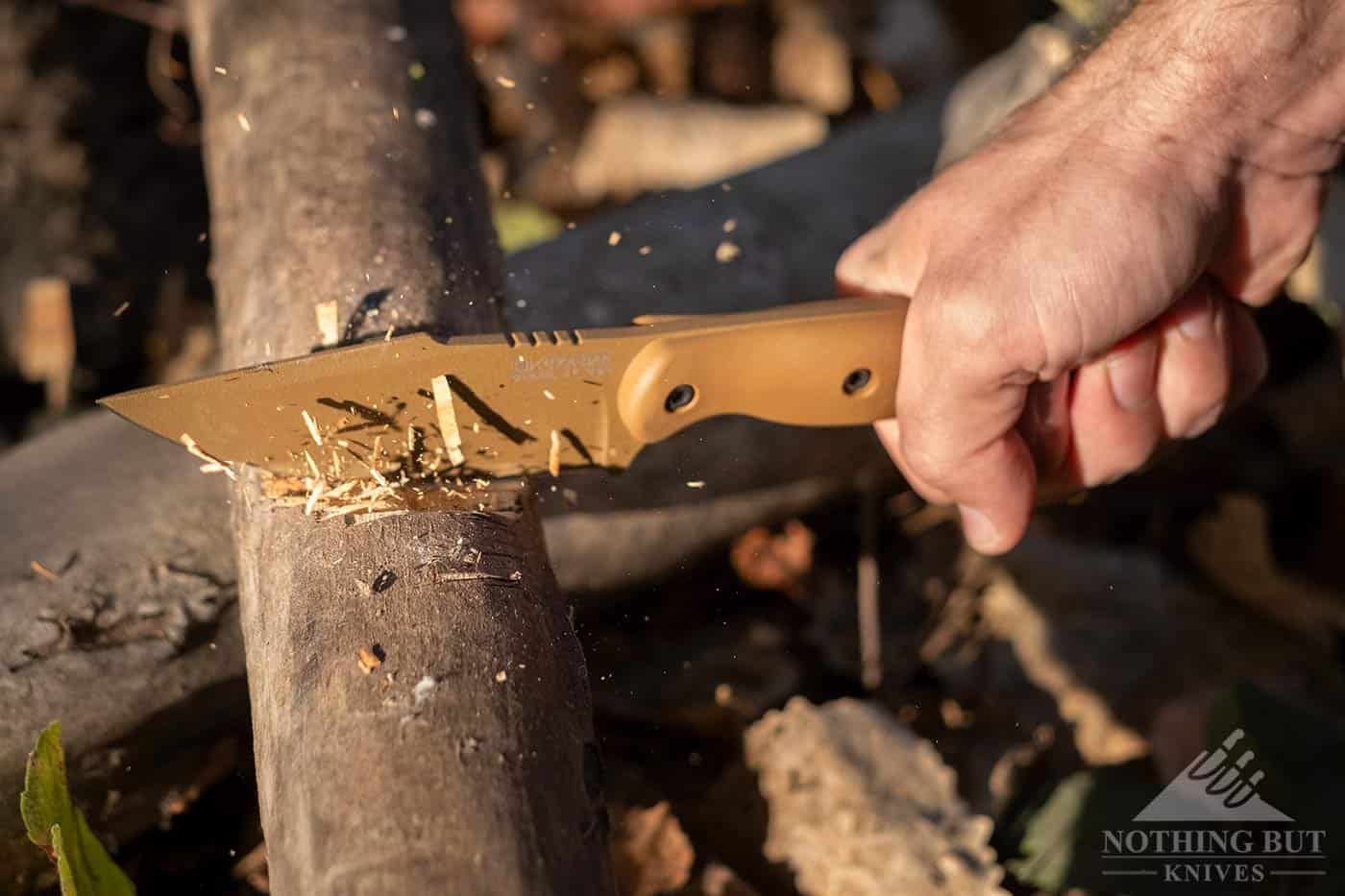
The BK18 is a little too small and too light to be a great chopper, but it did well considering its size and weight limitations. The handle shape is really comfortable even when the hand is choked back, so long chopping sessions are not uncomfortable like they are on a lot of knives this size.
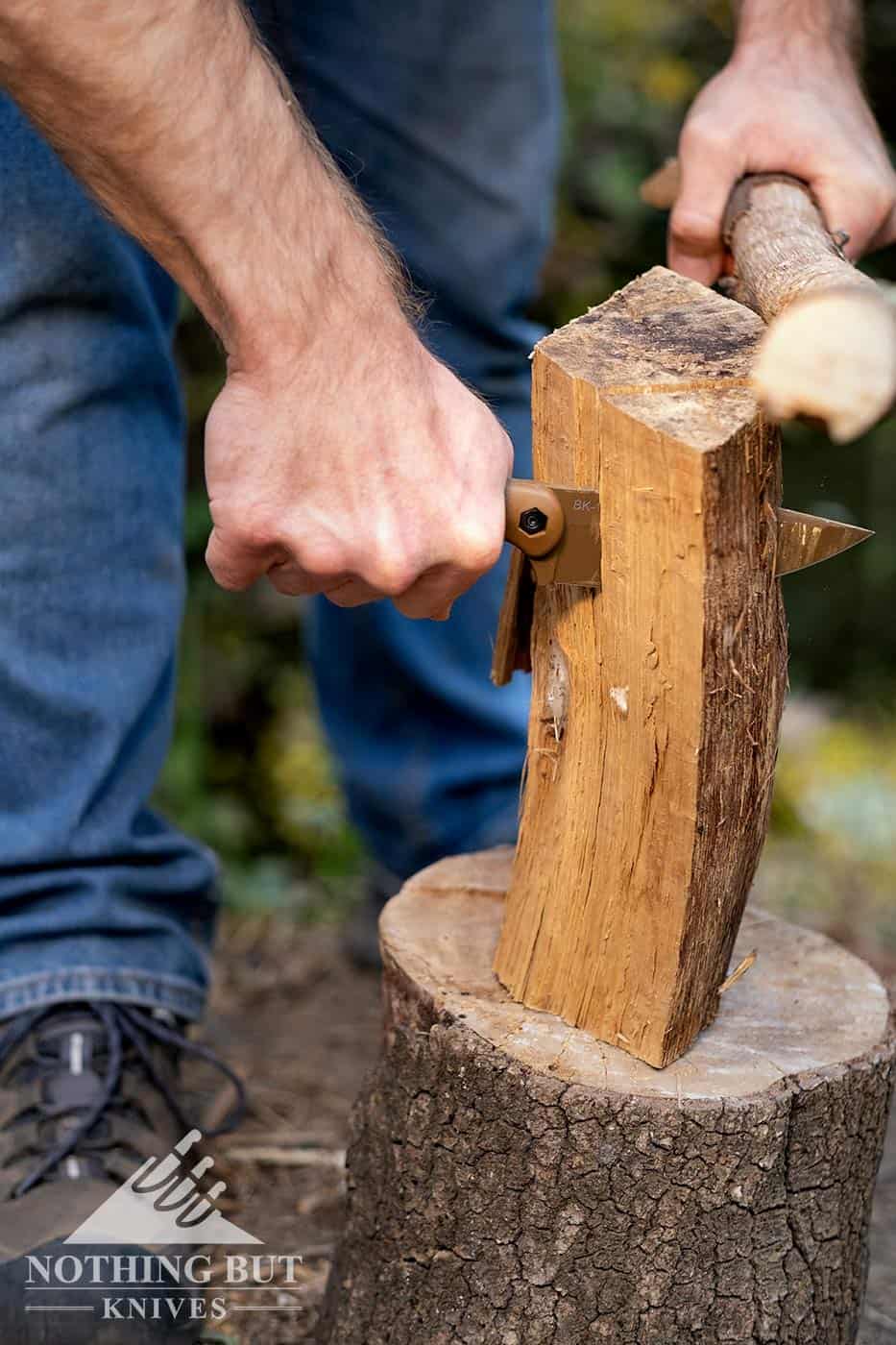
I was a little nervous about batoning with the BK18 because the blade tip looks thin. After closer inspection I realized the tip was not as thin as it seems and hammered away. The BK18 held up well even when batoning oak. It was slow going, but the blade survived without rolling or chipping. (Editor’s Note: Some of our hands looked worse than the edge did afterward).
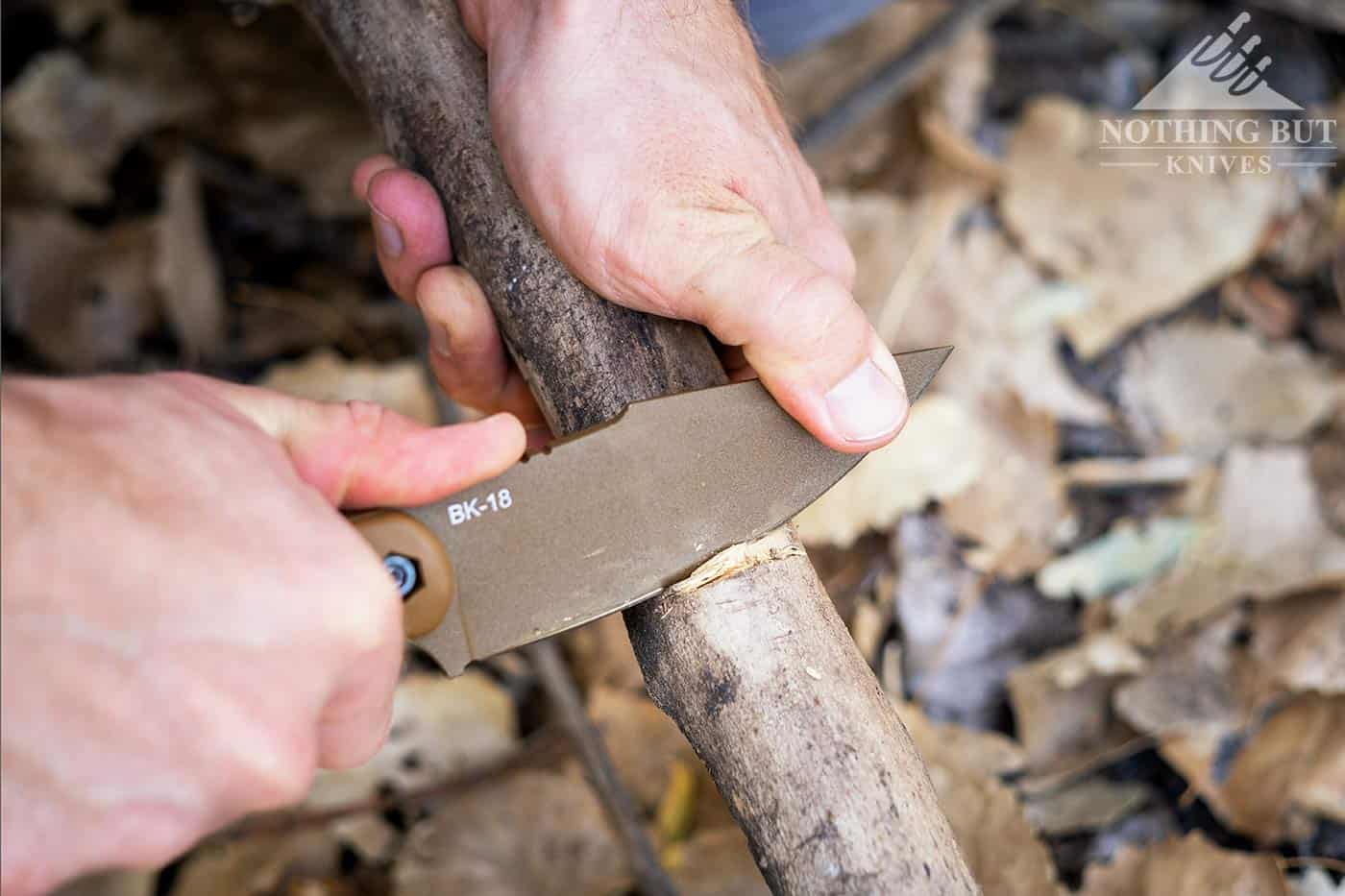
Carving, notch making, and other detail type tasks is where the BK18 really shined. In spite of its tactical credentials it really does make a great camping or backpacking knife.
The swedge between the harpoon hook and the blade tip was a little annoying when I needed to put my thumb on that section for support, but I assume the swedge also makes the BK18 better at piercing.
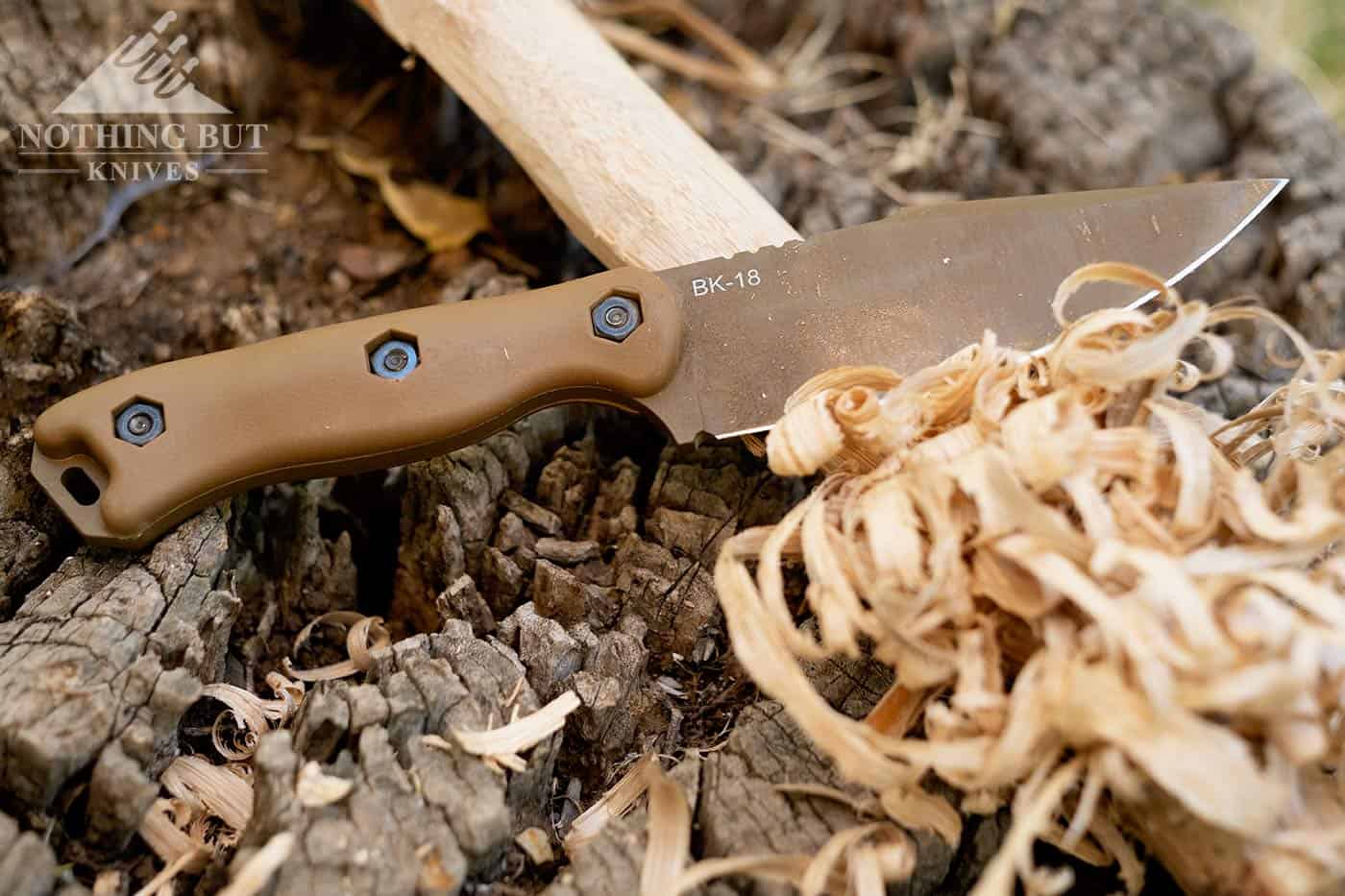
The BK18 feather sticked like a champ. I used multiple sections of the blade to make the feather stick above, so this knife is a good choice for feather sticking regardless of your preferred method. However, the coating of the BK18 prevents it from throwing any kind of spark, so you will not be able to light a feather stick with the BK18 and ferro rod unless you remove the traction coating from the blade.
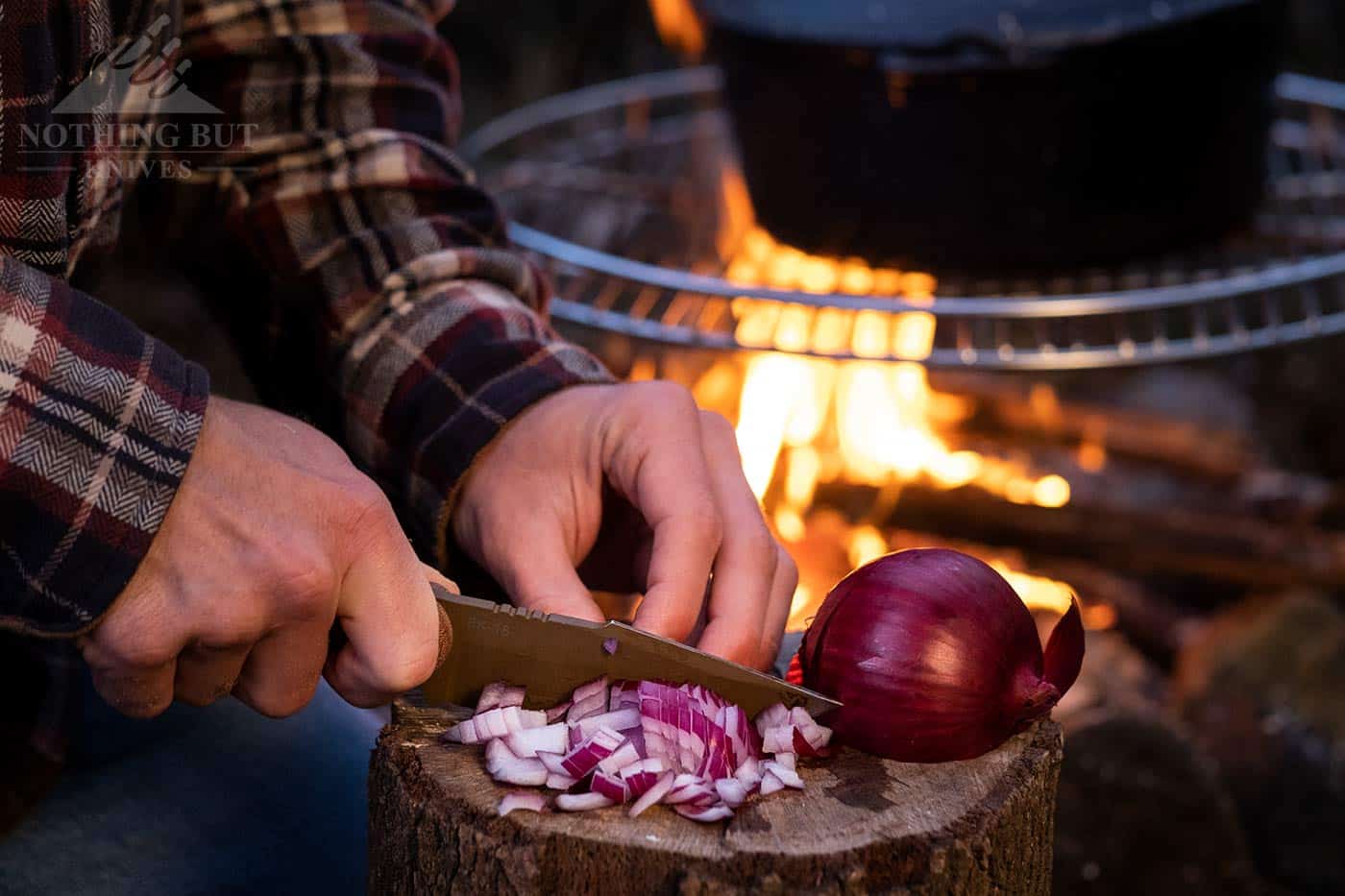
It was no surprise that the BK18 did a great job as a camping food prep knife. As I mentioned before, the relatively long curve and big belly of the blade make it great for food prep. I also appreciated the small size of the finger guard, because a bigger finger guard would have made certain types of chopping and slicing difficult.

I haven’t spent a lot of time talking about the tactical abilities of the BK18 mostly because I don’t really feel qualified. However, this knife was definitely designed as a self defense tool, and Ethan Becker has been designing knives for the military for over thirty years.
For what it is worth the BK18 did really well at our water bottle test. It sliced through the bottles much easier than just about any camping / bushcraft style knife I own with a blade under 5 inches. (Editor’s Note: It probably could have done five, but we ran out of bottles).
Comparison and Alternatives
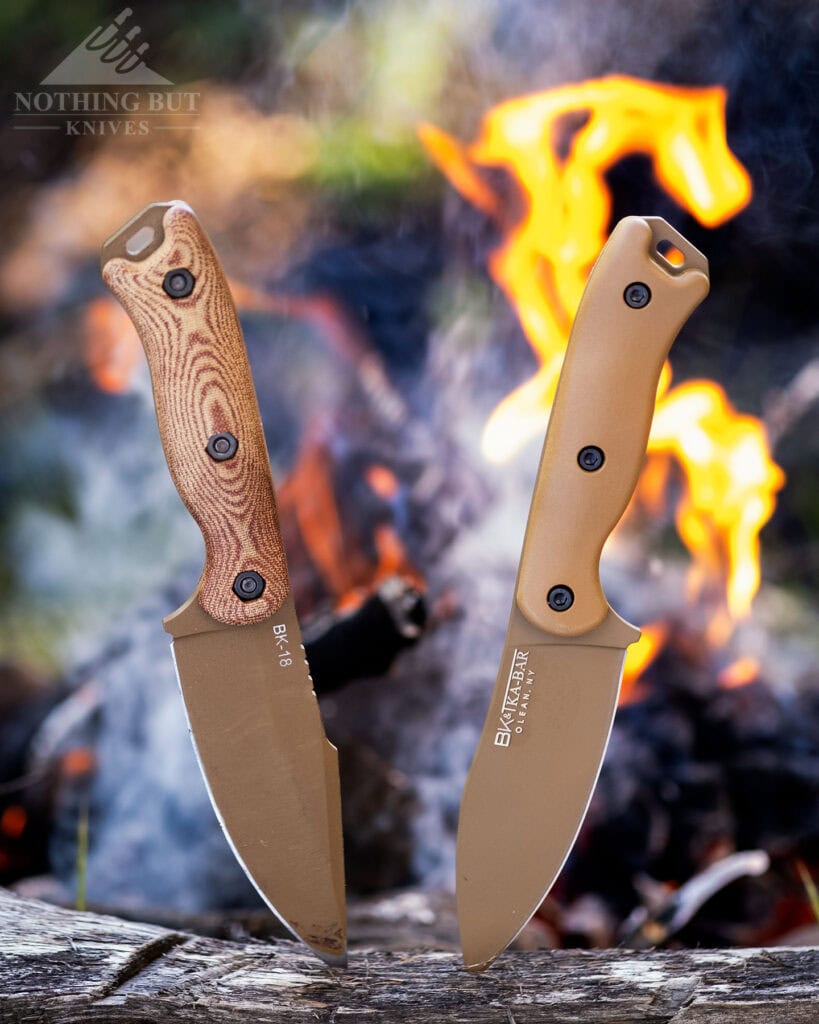
Inn 2023 ka-Bar announced the release of the Becker BK19 which is similar to the BK18 in every way other than blade shape. if you are a big Nessmuk fan, the BK19 is the way to go.
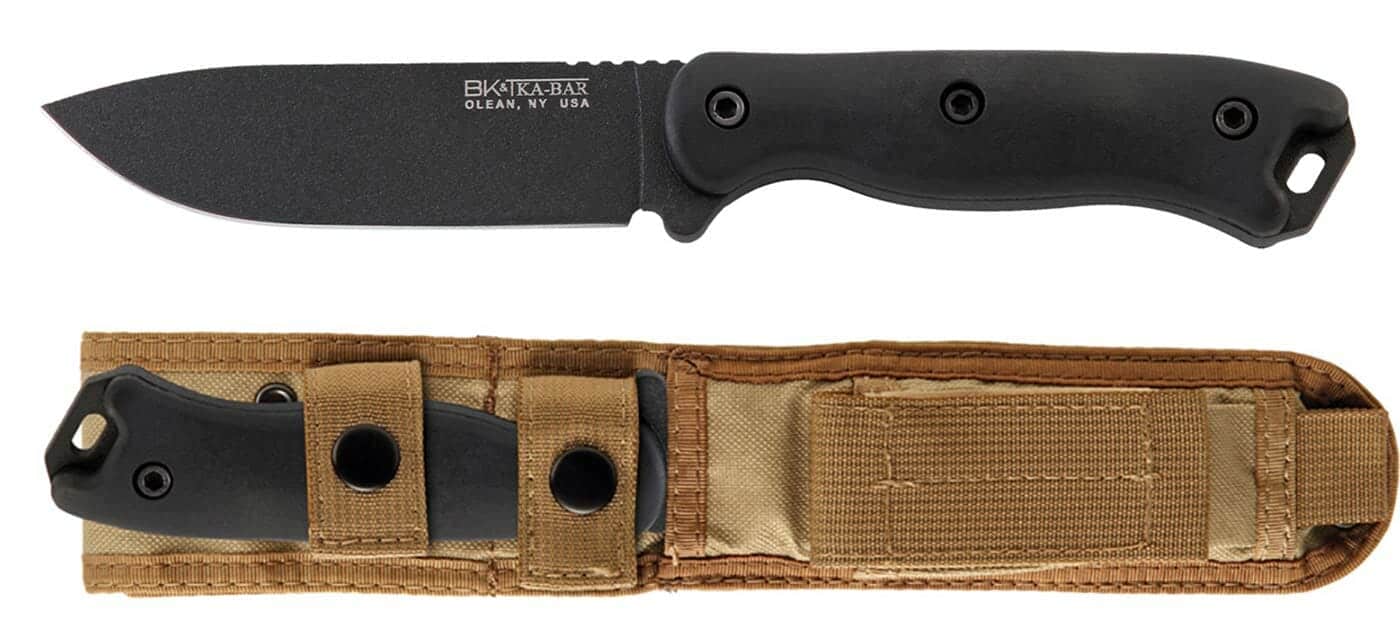
The similarities between the Ka-Bar Becker BK18 and the BK16 are obvious, and it would make sense for me to include a comparison in this review. But I am not going to do that, because I don’t want to spend the extra money. I am just going to irresponsibly continue with this review without ever laying a finger on the BK16.
There are a few excellent comparisons on YouTube by reviewers who have the drive and the money to compare the knives. If you were to leave this review to watch one of those videos, it may be a better use of your time. Basically they will tell you that if you want a straight bushcraft knife the BK16 is probably preferable, but if you want a survival / tactical hybrid style knife the BK18 is the way to go.
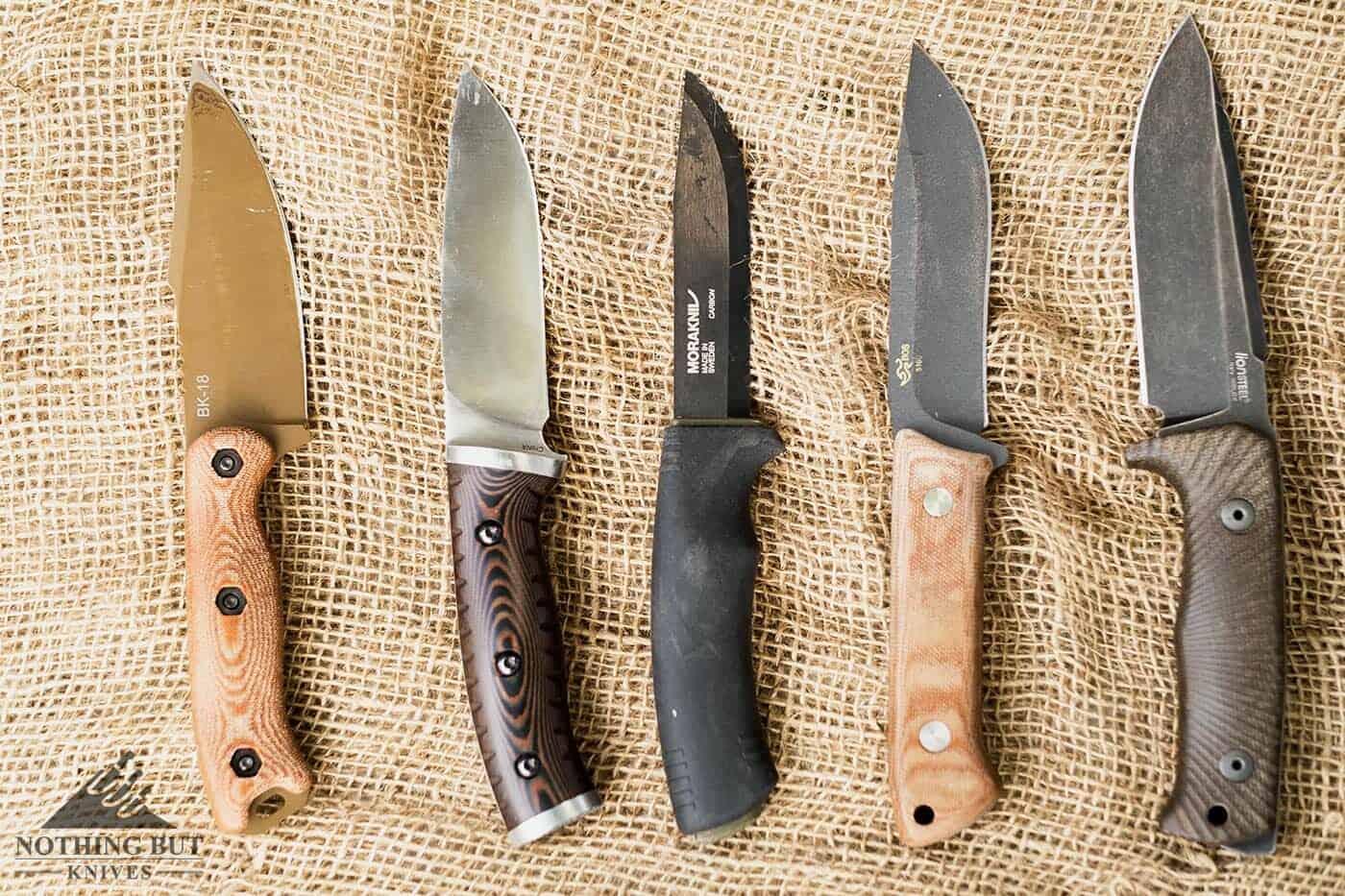
The image above contains a few of my favorite survival / tactical hybrid style knives. They range in price from $80 to $150. The base price of the BK18 is $90, but the Micarta handle upgrade costs around $40 after shipping and tax, so the final price for me after the handle upgrade was $130.
The Buck Selkirk is a little cheaper than the BK18, and it has a more versatile sheath. However, it’s edge retention, food prep ability, and handle ergonomics fall short of the BK18.
The Mora Bushcraft is also cheaper than the BK18 and its handle is a little easier to grip when wet. It is also capable of throwing spark which the BK18 can’t do without modification. However, the BK18 is much better at food prep and it ships with a superior sheath. The BK18 also has a full tang construction and a lanyard over the Mora Bushcraft.
The Buck Compadre ships with Micarta handle scales and I would choose it over the BK18 for field dressing large game, but the BK18 has a more versatile sheath, and its high sabre grind make it a better choice for bushcraft tasks like chopping or batoning. The edge retention of the two knives is similar.
The LionSteel T5 costs quite a bit more than the BK18 with the stock Zytel handles, but it is in the ballpark of the BK18 with the Micarta handle scale upgrade. The handle of the BK18 is surprisingly more comfortable than the highly touted one-piece Micarta handle of the T5.
The BK18 is also better at food prep. However, the T5’s Niolox steel blade holds its edge much better than the 1095 CRO-Van steel blade of the BK18. It is also better at pretty much every bushcraft type task from batoning to feather sticking.
One more alternative to the BK18 is the Spartan Blades Alala. It is made in the Ka-Bar factory.
Closing Thoughts on The BK18
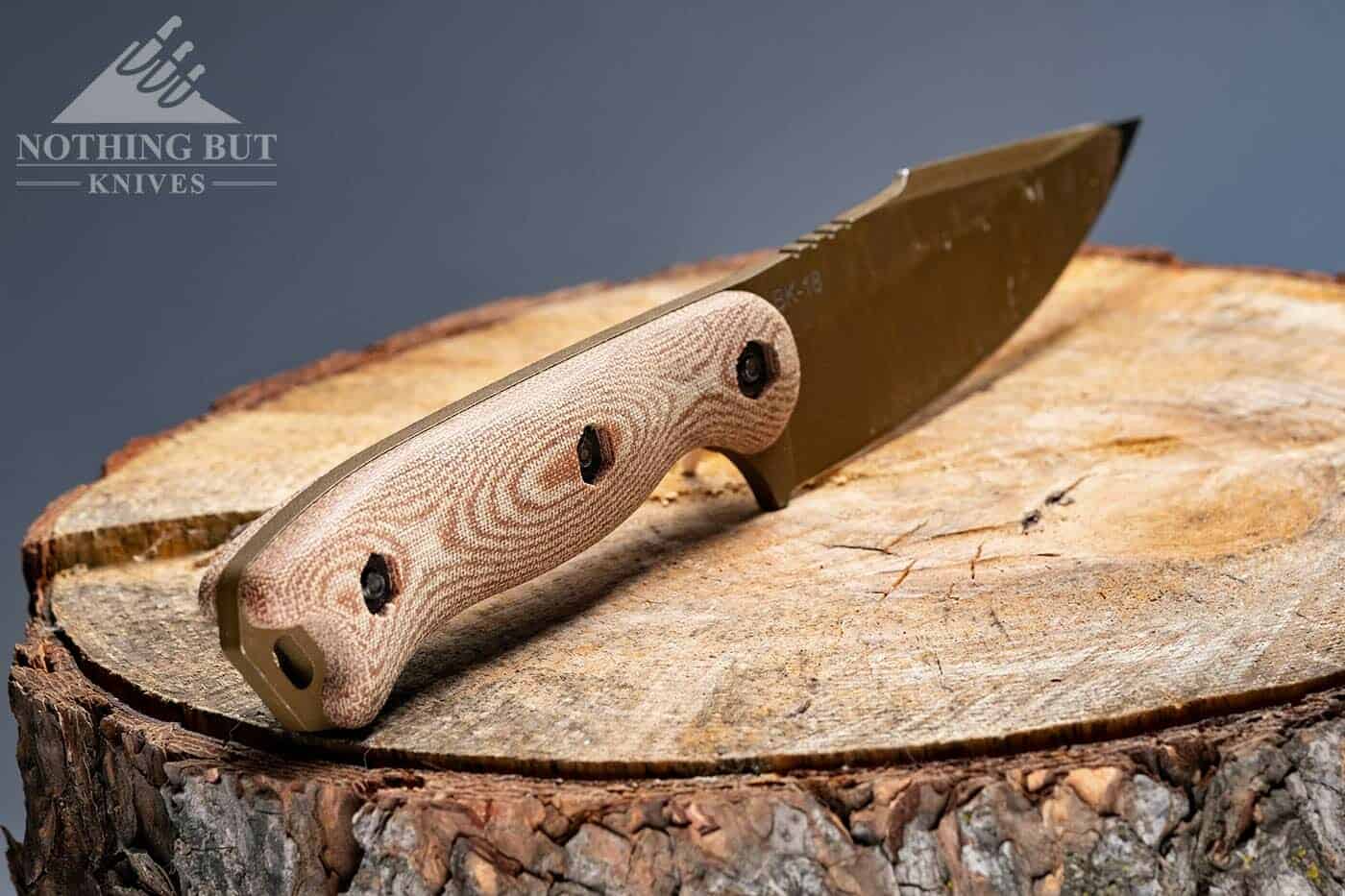
In uncertain times the intense appeal of a capable looking tactical knife is undeniable. I am not here to encourage you to resist that urge. A knife purchase should never be an exercise in self renunciation. However, if you have a choice between a straight up tactical knife and a tactical knife that is also handy on a camping trip, why not go for the hybrid. The BK18 is that hybrid.
The Ka-Bar Becker BK18 Harpoon is a versatile knife that would be a welcome addition to just about any camping, backpacking, or hunting excursion. It ships with an excellent sheath, and offers impressive performance for a sub $100 knife. Especially considering the knife and sheath are both made in the U.S.
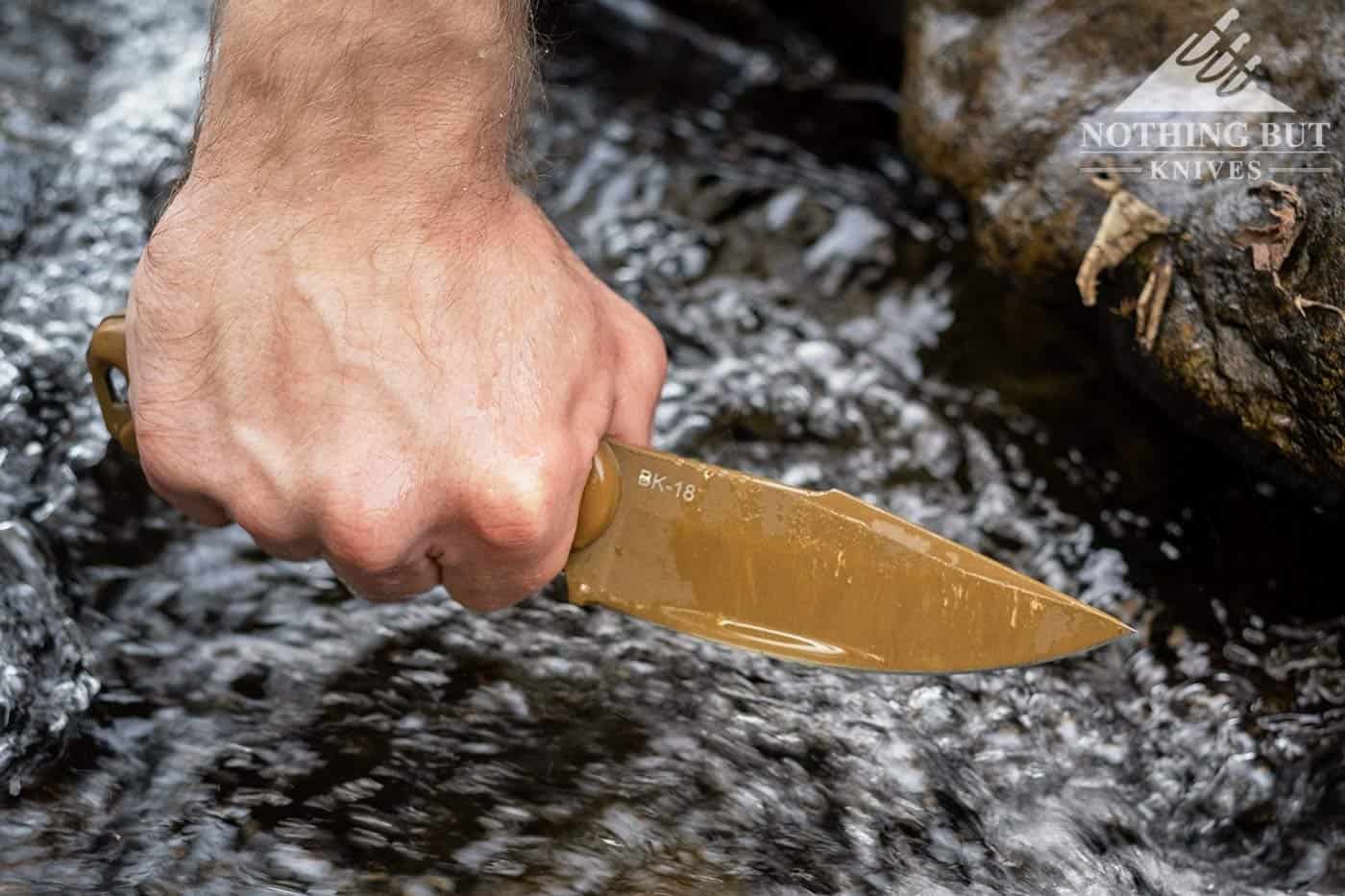
The traction coating is great to have when the knife gets wet, but it would be nice if they sold a version without traction coating so the BK18 could throw spark. I wish it shipped with Micarta handles rather than the Zytel handles. I also would prefer that the sheath were fully Tek-Lok compatible so I didn’t have to use a weird work around to carry the knife horizontally.
However, these small gripes have not resulted in even the smallest amount of buyers remorse. The BK18 is a well designed knife that I plan to take on many more outdoor excursions.
If you like the look of the BK18, but are not a fan of the harpoon shape, check out The Last Huntsman Outdoors’ video review of the Ka-Bar Becker BK19 Nessmuk or peruse a few of our favorite survival knives in our Top Survival Knife article.

Love the review, great writing, complete review in all ways. This knife just looks good!
Thanks much, Phillip.
I own this knife and use it on my chest rig with armor plates and ammo reloads. It has held up to low crawls.through gravel, simulated combat with sand bag and tactical bob torsos and opens mre’s with ease. LoL. Excellent value also
Thanks for the added info on the BK18 from the tactical side of things, Warren. Much appreciated.
“Penicillin and prostitution.” Arguably the finest pairing statement in the history of writing. Good on ya, mate. Just ordered this knife. Thanks for the objective review.
Thanks Matt. Glad you enjoyed the article. The BK18 is still one of my favorite fixed blades to come out in the last few years.
Thanks for your review. BK-18 is my first Becker’s knife and I don’t like it at first honestly. So I purchased another Becker’s knife that is the most popular BK-16. After test them in the kitchen, I found BK-18 is better then BK-16. I can use BK-18 to cut some frozen tofu and slice some frozen Schweinshaxe easily and It’s still very sharp. Of cause, BK-16 could do the same tasks. Due to its shape, grind & ergonomics, BK-18 performs much better IMHO.
Thanks for reading, DMC. The nice thing about this Ka-Bar Becker series is the slight variations that make it easy to get just what you need. We just picked up the Nessmuk version (BK19), so we will be adding that to this article after we spends a few weeks with it.
A bunch of non-hunting hipsters.
Well, shit. Secrets out, guys. Guess we gotta stop using knives now.
IMPORTANT NOTICE: I hate to be the bearer of bad news, but if you bought that BK18 recently it is a Fake. Story: I recently purchased a BK 18 at a gun show. It is Exactly like yours in this article. When I discussed the possibility of this being a counterfeit, they asked for phots, they asked me to send the knife to them. Sure enough, it was a fake as it contains USA on the blade. What I came to find out is the BK18 made after 2021 did Not contain USA on the knife. The very early BK18s did have USA on them. No New Bk18 have USA. If you have purchased one after 2021, and it has USA, it is a fake. BTW, Becker sent me a brand New BK18 (with NO USA). It was nice of them to do that. From what I can gather, Becker changed the type of carbon steel and now purchases from overseas, thus the USA is no longer on the knife. I have not confirmed that with KaBar. But I have confirmed that any Newer BK18s with USA on them are indeed Not from Becker (fake). If you email me I can give you my POC I spoke with at KaBar. I hope this helps.
Thanks for the heads up, Dave. Our BK18 was one of the first models out, and it came directly from Ka-Bar, so we are good. Thanks for the information. The counterfeit knife problem has gotten bad. The best way to avoid it is to order straight from the manufacturer.